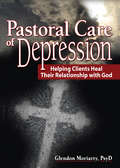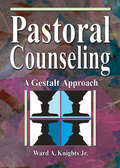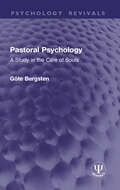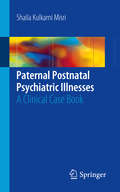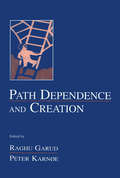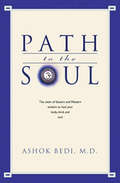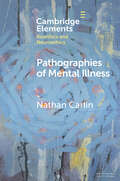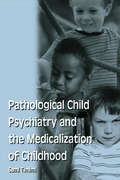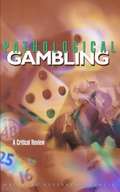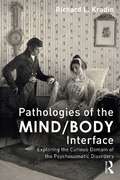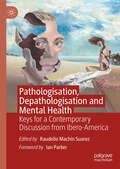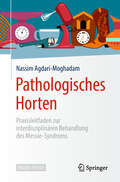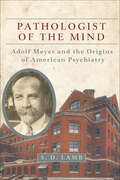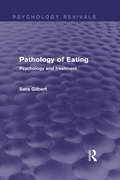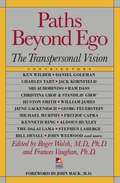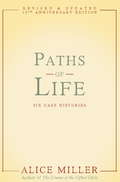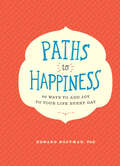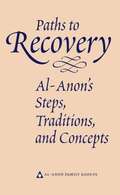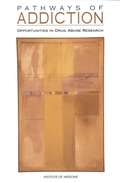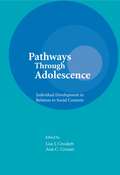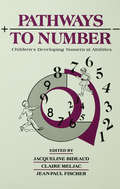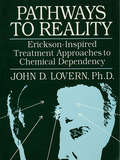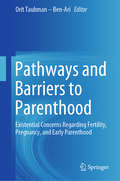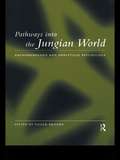- Table View
- List View
Pastoral Care of Depression: Helping Clients Heal Their Relationship with God
by Glendon MoriartyThis book provides the essential tools needed to transform negative God images in depressed clients! Pastoral Care of Depression: Helping Clients Heal Their Relationship with God is designed to help clergy and mental health professionals understand how depression negatively affects the way people emotionally experience God and how, through therapy, this hurtful God image can be changed into a much more positive one focused on healing.In the past, the God image (as well as the essential differentiation between God image and God concept) has been explained in dull, analytic terms that are difficult to understand. This book&’s jargon-free language and engaging presentation make it an effective learning tool for students and professionals alike. Inside, you&’ll find numerous psychological tests, complete with sample test forms, that identify the God image. These are clearly explained and include all the information needed to take, administer, and interpret them. Pastoral Care of Depression teaches you to use psychodynamic and cognitive interventions to change a client&’s God image, including foundational knowledge and clearly presented techniques to implement in the therapeutic relationship. This comprehensive treatment manual arms you with the most comprehensive array of cognitive interventions published to date, with tens of easy-to-follow techniques designed to tap directly into an individual&’s subjective experience of God. Two appendixes give you a sample God Image Automatic Thought Record and Treatment Plan form.Part I: Depression and the God Image examines: the nature and development of depression symptoms of depression specific to religious people defining a client&’s image of God, how it developed, and what it reveals the relationship between self, depression, and God image, and how God images relate to Christian thoughtPart II: Changing the God Image addresses: the importance of self-evaluation for therapists and counselors-and how to do it the nature of the therapeutic relationship counseling skills that strengthen the therapeutic relationship how to conduct an God Image Assessment Interview and how to work with what that interview reveals transference, countertransference, cyclical maladaptive patterns, and internalization in psychodynamic psychotherapy appropriate, effective psychodynamic interventions the essentials of cognitive therapy and how it can be utilized to positively affect the God image treatment planning and case conceptualization important ethical issues for considerationWith well-designed test and exercise forms and clear instructions on their use and interpretation, Pastoral Care of Depression provides the essential tools needed to work effectively with this important client group. Make it a part of your professional/teaching collection today!
Pastoral Counseling: A Gestalt Approach
by Harold G Koenig Ward A Knights, JrThis contemporary counseling approach seamlessly meshes with pastoral theology!Gestalt therapy is designed to be simple, free of jargon, and emotionally liberating--ideal for pastoral counseling in the context of a variety of faiths. This primer is designed to give pastors and rabbis a working knowledge of the basic techniques and attitudes pioneered by Dr. Fritz Perls. Pastoral Counseling: A Gestalt Approach shows how this holistic approach, with its emphasis on the here and now, is a natural counterpoint to pastoral theology. This comprehensive book gives specific instructions on using Gestalt techniques to increase the depth of the pastoral care and counseling you provide. Pastoral Counseling explains the basic goals of Gestalt work, which are to achieve spontaneity and expressiveness and to move toward personal authenticity. It also reveals how you can employ these techniques to help you and your congregation move toward realizing your God-given potential. Pastoral Counseling illustrates Gestalt theories from several perspectives, including: theory and techniques case studies a folk tale session transcripts a sermonPastoral Counseling guides you toward a broader understanding of the simple power of the holistic approach. Pastors and priests, rabbis, and other members of the clergy who engage in counseling will find its simple wisdom refreshing amidst the desert of dry theory. Gestalt counselors will find its pastoral perspective enlightening in their work with clients.
Pastoral Psychology: A Study in the Care of Souls (Psychology Revivals)
by Göte BergstenOriginally published in 1951, unlike most books dealing with psychology and pastoral work at the time, this work is not concerned solely with the application of psycho-therapeutic principles to the work of the minister. It is dominated by the need for the pastoral care which the normal member of the Church needs. The author’s foremost aim is to show that pastoral psychology should find its own techniques; even if it uses the experiences of psychotherapy, it is to be considered as an independent form of personality treatment.His introductory chapter deals with the relationships between psychology and the care of souls and gives a historical survey. He then deals with the help that medical psychology can give pastoral psychology and gives an excellent chapter on methods of treatment. The problem of scepticism which Bergsten says can often be considered as a neurotic symptom, and the problem of real and apparent guilt are treated exhaustively and in a particularly fresh manner. He is very critical of the Freudian doctrine of sublimation. In his treatment of the dream problem Bergsten stresses the similarity between dream and drama and compares the dream with an old mystery play, which shows the way out of the actual conflict. Finally, he deals with Mental Illness and Religion and gives advice for the relatives of those who are mentally ill.Pastoral Psychology deals thoroughly with every aspect of the subject in a fresh and vivid manner. At the time it was a book from which the professional psychiatrist was thought to gain as much as the Minister or Pastor.
Paternal Postnatal Psychiatric Illnesses: A Clinical Case Book
by Shaila Kulkarni MisriThis book is the first to present the current research showing that like mothers, some fathers struggle with postpartum psychiatric illnesses and have unique needs of their own. Each chapter opens with a case vignette that describes different psychopathologies in the father and demonstrates the unique struggles presented by each situation. The cases highlight social, emotional and cultural upheaval that fathers may experience during the postpartum period. Sections in each chapter include manifestations of their illness, DSM-5 diagnoses, case discussion, treatment interventions and recommendations for health care professionals. This volume also puts paternal postpartum depression into conversation with other psychiatric comorbidities, including various personality disorders, anxiety disorders, and addictions. The text also addresses the various stigmas associated with these unique cases and offers clinical pearls on how to treat these families while giving consideration to the needs of the family.Written by renown experts in postpartum health, Paternal Postnatal Psychiatric Illnesses is an excellent resource for psychiatrists, psychologists, family therapists, general practitioners, obstetricians, social workers, and all clinicians working with postpartum families.
Path Dependence and Creation (Organization and Management Series)
by Raghu Garud Peter KarnøeThe editors, aware of the recent work in evolutionary theory and the science of chaos and complexity, challenge the sometimes deterministic flavor of this subject. They are interested in uncovering the place of agency in these theories that take history so seriously. In the end, they are as interested in path creation and destruction as they are in path dependence. This book is compiled of both theoretical and empirical writings. It shows relatively well-known industries, such as the automobile, biotechnology, and semi-conductor industries in a new light. It also invites the reader to learn more about medical practices, wind power, lasers, and synthesizers. Primarily written for academicians, researchers, and Ph.D. students in fields related to technology management, this book is research-oriented and will appeal to all managers.
Path to the Soul: The Union Of Eastern And Western Wisdom To Heal Your Body, Mind And Soul
by Ashok BediA Jungian psychoanalyst &“offers a Hindu spin on therapy, challenging readers to rethink childhood conflict and marital strife in terms of karma and dharma&” (Publishers Weekly). Path to the Soul provides an important evolutionary leap in the rapidly evolving understanding of our psychological and spiritual essence. Drawing from Hindu and Christian spiritual wisdom, biological medicine, psychiatric technique, and over twenty-five years of clinical experience, Dr. Bedi has created a highly effective and integrated treatment approach to problems associated with both medical and psychiatric illness. He explains the Hindu concepts of maya, karma, and dharma, and builds a bridge between psychological disease and our intrinsic hunger for spiritual union. Each symptom is seen as a crucial whisper from our soul, and if we understand its message, it can lead us to psychological balance. Dr. Bedi guides us through the process of Kundalini diagnosis, showing how the use of life events, medical or psychiatric symptoms, relationship strengths and problems, and life goals and aspirations can help us determine our dominant and auxiliary chakras. Since our chakras are focal points where physical, emotional, developmental, and spiritual forces intersect, they provide a paradigm that usefully links physical, psychological, developmental, and spiritual dimensions. He explains how he has successfully helped many patients correct imbalances by learning to access and strengthen this energy. Throughout this book there are numerous examples of how Dr. Bedi&’s patients have discovered what each individual eventually has to recognize; that our fulfillment, satisfaction, wholeness, and harmony can be reawakened when we touch the spark of divine light glowing within.
Pathographies of Mental Illness (Elements in Bioethics and Neuroethics)
by Nathan CarlinThis Element is a survey of the field of pathographies of mental illness. It explores classic texts in the field as well as other selected contemporary memoirs. In doing so, the reader is introduced to psychiatric information about various mental illnesses through a narrative lens, emphasizing experience. Because clinical research is evidenced-based and aims to produce generalizable knowledge (i.e., trends), the reading of pathographies can complement these findings with practical experiential insights. By pairing psychiatric information with pathographies, certain personal themes become apparent that are different from the empirical trends identified by scientific and medical researchers. Based on the survey presented here, this Element identifies seven such themes, laying the foundation for future research, inquiry, practice, and policy.
Pathological Child Psychiatry and the Medicalization of Childhood
by Sami TimimiCurrently, it is common practice among the child psychiatric establishment to prescribe powerful and potentially addictive drugs to children who have emotional or behavioural problems. Pathological Child Psychiatry and the Medicalization of Childhood is a strong challenge to this way of thinking.Sami Timimi uses a wide variety of sources that shape our understanding including his personal experiences to highlight the role of culture, beliefs, science, social hierarchy and power, in shaping our understanding of childhood problems and how to deal with them. He urges professionals who work with children to question their assumptions in a manner that will enable them to access a greater variety of potentially helpful therapeutic frameworks.Since the 1960s, psychiatry has had to learn to accommodate critical analysis of its beliefs and methods. The legitimacy of its core assumptions continues to be questioned. Now child psychiatry too must engage with such a debate, if it wishes to develop into a genuinely democratic and inclusive profession. Pathological Child Psychiatry and the Medicalization of Childhood will be of great interest to professionals and trainees in psychiatry and child psychiatry, social work, family therapy and other psychotherapies for children and adolescents.
Pathological Gambling: A Critical Review
by National Research CouncilAs states have moved from merely tolerating gambling to running their own games, as communities have increasingly turned to gambling for an economic boost, important questions arise. Has the new age of gambling increased the proportion of pathological or problem gamblers in the U.S. population? Where is the threshold between "social betting" and pathology? Is there a real threat to our families, communities, and the larger society? Pathological Gambling explores America's experience of gambling, examining: The diverse and frequently controversial issues surrounding the definition of pathological gambling.Its co-occurrence with disorders such as alcoholism, drug abuse, and depression.Its social characteristics and economic consequences, both good and bad, for communities.The role of video gaming, Internet gambling, and other technologies in the development of gambling problems.Treatment approaches and their effectiveness, from Gambler's Anonymous to cognitive therapy to pharmacology. This book provides the most up-to-date information available on the prevalence of pathological and problem gambling in the United States, including a look at populations that may have a particular vulnerability to gambling: women, adolescents, and minority populations. Its describes the effects of problem gambling on families, friendships, employment, finances, and propensity to crime.How do pathological gamblers perceive and misperceive randomness and chance? What are the causal pathways to pathological gambling? What do genetics, brain imaging, and other studies tell us about the biology of gambling? Is there a bit of sensation-seeking in all of us? Who needs treatment? What do we know about the effectiveness of different policies for dealing with pathological gambling? The book reviews the available facts and frames the intriguing questions yet to be answered.Pathological Gambling will be the odds-on favorite for anyone interested in gambling in America: policymakers, public officials, economics and social researchers, treatment professionals, and concerned gamblers and their families.
Pathological Lying, Accusation, and Swindling: A Study in Forensic Psychology
by William Healy Mary HealyPathologies of the Mind/Body Interface: Exploring the Curious Domain of the Psychosomatic Disorders
by Richard L. KradinPatients suffering from psychosomatic disorders represent a formidable challenge. Psychosomatic disorders are common, and account for substantial personal discomfort, unnecessary medical expenditures, socioeconomic loss, and disability. They are challenging to diagnose, treat, and are rarely completely cured. Furthermore, they often provoke strong negative reactions from family, friends, and caregivers, who are unable to fathom their inconsistencies. Currently, little is known as to how they develop or why their symptoms tend to transform over time. In Pathologies of the Mind/Body Interface, Richard Kradin, a medical internist, pulmonologist, and psychoanalyst at a large Harvard hospital, examines the historical, philosophical, cultural, psychological, and neurobiological factors that contribute to the development of psychosomatic disorders. He focuses on the role that developmental stress and attachment disorders appear to play in increasing the risk of developing psychosomatic symptoms, and advises medical practitioners and psychologists on how to diagnose and treat them. Dr. Kradin suggests areas of importance for future medical and psychological research into the causes and treatments of these debilitating disorders.
Pathologisation, Depathologisation and Mental Health: Keys for a Contemporary Discussion from Ibero-America
by Raudelio Machin SuarezThis book examines the pathologisation and depathologisation of mental health in Ibero-América. It highlights the possibilities and the epistemic limits of the interpretative models of pathos that have legitimised mental health pathologies. Further, it proposes a rereading of psychopathology and analyses the clinical, philosophical, ontological, ethical, psychological and anthropological consequences of this. Across ten chapters it brings together academics from Latin America with colleagues from Europe, Asia and North America to address issues including stigma, aesthetics, childhood, gender, migration, political public or social networks and their relationship with mental health. Section 1 brings critical psychology into dialogue with psychiatry, sociology, philosophy and psychoanalysis to review the conceptual frameworks through which "pathology" has been understood in "psy" discourses. Section 2 presents a range of case studies that demonstrate the impact of debates around the pathologisation and de-pathologisation on mental health care in various populations across Latin American. It will offer fresh insights to practitioners, as well as to students and scholars working in the areas of mental health, critical psychology, medical sociology, Latin American studies, psychiatry and psychoanalysis.
Pathologisches Horten: Praxisleitfaden zur interdisziplinären Behandlung des Messie-Syndroms
by Nassim Agdari-MoghadamDas Messie-Syndrom oder pathologisches Horten – eine neue psychische Störung: Fast jeder Mensch kennt Situationen, in denen es schwerfällt, sich von Gegenständen zu trennen, so dass sich rasch Unordnung ausbreitet. Bei manchen ist das nur eine Lade oder betrifft ausschließlich das Auto oder ein Zimmer. Bei manchen Menschen jedoch betrifft es den gesamten Lebensbereich und führt zu einer massiven Einschränkung der Lebensqualität. Was sind die Chancen und Schwierigkeiten einer psychischen Diagnose? Nach welchen Kriterien kann das Phänomen diagnostisch erfasst werden? Wie entsteht und entwickelt sich das pathologische Horten? Wie kann man Betroffene professionell psychotherapeutisch und psychosozial begleiten und behandeln? Die Autorin diskutiert diese und weitere Fragen auf Basis psychoanalytischer Theorien und leitet daraus praxisnahe Behandlungsempfehlungen für Psychotherapeutinnen, Psychiater und Psychologen ab. Auch für weitere Professionisten multidisziplinärer Teams, wie Hausärzte, Sozialarbeiter und Familienbetreuer, sowie Lehrende und Studierende bietet das Buch wertvolle Informationen.
Pathologist of the Mind: Adolf Meyer and the Origins of American Psychiatry
by S. D. LambIlluminating the contributions of Adolf Meyer, the pioneering father of modern American psychiatry.Winner of the CHOICE Outstanding Academic Title of the Choice ACRLDuring the first half of the twentieth century, Adolf Meyer was the most authoritative and influential psychiatrist in the United States. In 1908, when the Johns Hopkins Hospital established the first American university clinic devoted to psychiatry—still a nascent medical specialty at the time—Meyer was selected to oversee the enterprise. The Henry Phipps Psychiatric Clinic opened in 1913, and Meyer served as psychiatrist-in-chief at Johns Hopkins until 1941. In Pathologist of the Mind, S. D. Lamb explores how Meyer used his powerful position to establish psychiatry as a clinical science that operated like the other specialties at the country’s foremost medical school and research hospital. In addition to successfully arguing for a scientific and biological approach to mental illness, Meyer held extraordinary sway over state policies regarding the certification of psychiatrists. He also trained hundreds of specialists who ultimately occupied leadership positions and made significant contributions in psychiatry, neurology, experimental psychology, social work, and public health. Although historians have long recognized Meyer’s authority, his concepts and methods have never before received a systematic historical analysis. Pathologist of the Mind aims to rediscover Meyerian psychiatry by eavesdropping on Meyer’s informal and intimate conversations with patients and colleagues. Weaving together private correspondence and uniquely detailed case histories, Lamb examines Meyer’s efforts to institute a clinical science of psychiatry in the United States—one that harmonized the expectations of scientific medicine with his concept of the person as a biological organism and mental illness as an adaptive failure. The first historian ever granted access to these exceptional medical records, Lamb offers a compelling new perspective on the integral but misunderstood legacy of Adolf Meyer.
Pathology of Eating: Psychology and Treatment (Psychology Revivals)
by Sara GilbertOriginally published in 1986, Sara Gilbert provided the first systematic and comprehensive coverage of the psychological aspects of eating disorders and their treatment. The book begins with an account of normal eating behaviour and the problems of explaining its control in the individual in the context of social and cultural influences. It describes cross-cultural differences in attitudes to being overweight or underweight, and the current western dilemma of pressures towards slimness on the one hand and the increasing demand for choice and fast food on the other. In Part II, the author describes the phenomena of overeating and undereating, both in relation to people with systemic disease and in people suffering from obesity, anorexia nervosa and bulimia. She examines the psychological causes of overeating and undereating, and the problems of drawing a line between purely medical and purely social-psychological explanations. In Part III of the book, the author provides a summary of treatments for overeating and undereating, with emphasis on the psychological approaches. She describes new developments, in particular in the use of behavioural techniques, and their significance as a means of allowing individual sufferers some choice in the course of their own treatment.
Paths Beyond Ego: The Transpersonal Vision
by Roger Walsh Frances VaughanThe fifty essays that make up Paths Beyond Ego apply transpersonal thinking to individual growth, psychotherapy, meditation, dreams, psychedelics, science, ethics, philosophy, ecology, and service. The result is an integrated and comprehensive overview of the many dimensions of human experience.
Paths of Life: Six Case Histories
by Alice MillerSeveral poignant scenarios and two essays of reflection focus on a range of issues-from birth, motherhood, and partnership to hatred, cults, and the Holocaust. In this updated tenth anniversary edition, Alice Miller offers new reflections on the transformative power of childhood.
Paths to Happiness: 50 Ways to Add Joy to Your Life Every Day
by Edward HoffmanA psychologist offers fifty science-backed ideas, activities, and adventures for cultivating a happier mindset.From positive psychology expert Edward Hoffman, Ph.D., Paths to Happiness guides you through fifty fun, stimulating, mind-opening ways to achieve greater joy and feel more fulfilled. From dabbling in watercolors to expressing gratitude, embracing nostalgia to power napping, each suggestion in this book has been shown by scientific research to increase happiness and support well-being.Every topic is explored in a digestible manner and invites readers to reflect on their lives, with easy ways to cultivate a happier mindset. The easy dip-in, dip-out style and engaging activities make this accessible guide to finding happiness in daily living—one that can be revisited again and again.
Paths to Recovery: Al-Anon's Steps, Traditions and Concepts
by Al-Anon Family GroupsThis comprehensive volume will guide Al-Anon members worldwide as they study the program's three legacies and put them to work in their lives.
Pathways Of Addiction: Opportunities In Drug Abuse Research
by Committee on Opportunities in Drug Abuse ResearchDrug abuse persists as one of the most costly and contentious problems on the nation's agenda. Pathways of Addiction meets the need for a clear and thoughtful national research agenda that will yield the greatest benefit from today's limited resources.The committee makes its recommendations within the public health framework and incorporates diverse fields of inquiry and a range of policy positions. It examines both the demand and supply aspects of drug abuse.Pathways of Addiction offers a fact-filled, highly readable examination of drug abuse issues in the United States, describing findings and outlining research needs in the areas of behavioral and neurobiological foundations of drug abuse. The book covers the epidemiology and etiology of drug abuse and discusses several of its most troubling health and social consequences, including HIV, violence, and harm to children.Pathways of Addiction looks at the efficacy of different prevention interventions and the many advances that have been made in treatment research in the past 20 years. The book also examines drug treatment in the criminal justice setting and the effectiveness of drug treatment under managed care.The committee advocates systematic study of the laws by which the nation attempts to control drug use and identifies the research questions most germane to public policy. Pathways of Addiction provides a strategic outline for wise investment of the nation's research resources in drug abuse. This comprehensive and accessible volume will have widespread relevance--to policymakers, researchers, research administrators, foundation decisionmakers, healthcare professionals, faculty and students, and concerned individuals.
Pathways Through Adolescence: individual Development in Relation To Social Contexts (Penn State Series on Child and Adolescent Development)
by Lisa J. Crockett Ann C. CrouterAdolescent researchers are increasingly aware that they must examine development both across time and across context. To do so, however, requires new conceptualizations and methodological approaches to the study of development, including attention to the pathways young people choose in adolescence and follow into adulthood. This volume assembles work by key researchers in the field who are struggling to understand how developmental trajectories are constructed and maintained throughout the adolescent period. A complete understanding of developmental pathways requires the recognition that adolescents' social contexts--family, school, neighborhood, and/or peer group--are important influences on the choices they make at this developmental period. Researchers have traditionally studied contexts in isolation rather than examining the interrelationships among contexts and their implications for adolescent development. The present volume seeks to address this gap in the literature, with attention given not only to the interrelationships among contexts for white, middle-class youth, but also to these issues for minority adolescents in neighborhoods that vary in terms of access to resources. It concludes with an examination of researcher-community collaboration as a strategy to move communities toward a greater awareness of adolescent development and the problems facing youth in their community, and as a means to promote potential avenues for policy change and intervention.
Pathways To Number: Children's Developing Numerical Abilities
by Jacqueline Bideaud Claire Meljac Jean-Paul FischerThis volume celebrates the 50th anniversary of the famous and influential work of Jean Piaget and Alina Szeminska, The Child's Conception of Number. It is a tribute to those two authors as well as to the entire Geneva school that pioneered the genetic study of cognitive structures in children. Dealing with the process of the child's construction of the notion of number -- a very important subject for the child as well as for the teacher, the researcher, and the practicing psychologist -- it summarizes the progress that has been made and outlines new research directions in this area. The book is a compilation of the work of the foremost international researchers in this area and includes a wide spectrum of viewpoints and schools of thought. It also introduces several new authors from Europe, including students of Piaget, to the American academic community.
Pathways To Reality: Erickson-Inspired Treatment Aproaches To Chemical dependency
by John D. LovernConsiders the use of Erickson-inspired therapeutic techniques in the treatment of chemical dependency. It also provides an overview of Erickson-Inspired Approaches To Treatment, Including Motivation, utilization, confusion, trance, the indirect approach and ordeals.
Pathways and Barriers to Parenthood: Existential Concerns Regarding Fertility, Pregnancy, and Early Parenthood
by Orit Taubman – Ben-AriThis volume explores the transition to parenthood from a holistic developmental approach, relating to barriers such as fertility problems and traumatic childbirth, as well as pathways such as positive experiences of pregnancy and childbirth. It presents an extended process, beginning with infertility issues, continuing with subjects pertaining to decisions regarding parenthood, pregnancy and birth, and ending with the early stages of parenthood from a positive psychology perspective. The volume draws on theories of resilience, meaning, terror management, and attachment, and considers psychological, sociological, legal, policy, medical, and therapy issues. It relates to the developmental needs of individuals and couples, as well as to the role played by family, society, and the media, offering a comprehensive in-depth evaluation of the latest topics.
Pathways into the Jungian World: Phenomenology and Analytical Psychology
by Roger BrookeIn Pathways into the Jungian World contributors from the disciplines of medicine, psychology and philosophy look at the central issues of commonality and difference between phenomenology and analytical psychology. The major theme of the book is how existential phenomenology and analytical psychology have been involved in the same fundamental cultural and therapeutic project - both legitimize the subtlety, complexity and depth of experience in an age when the meaning of experience has been abandoned to the dictates of pharmaceutical technology, economics and medical psychiatry. The contributors reveal how Jung's relationship to the phenomenological tradition can be, and is being, developed, and rigorously show that the psychological resonance of the world is immediately available for phenomenological description.
